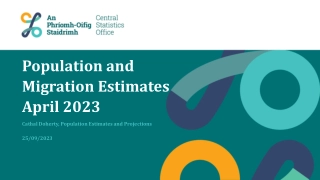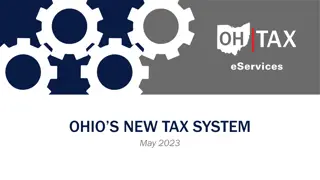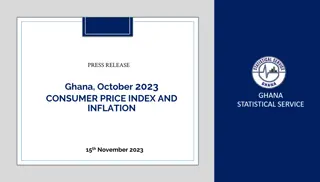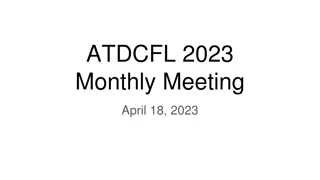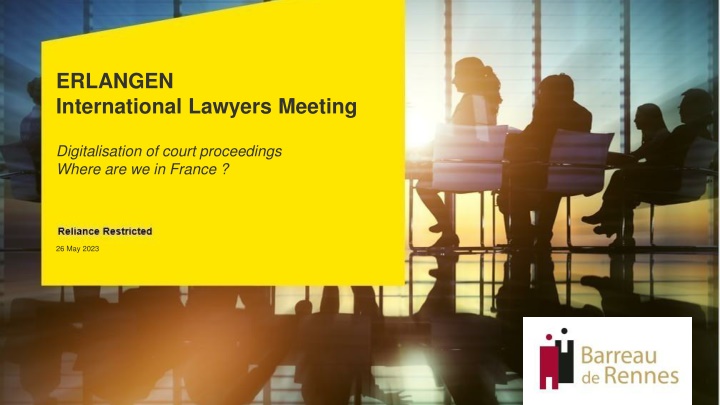
Digitalisation of Court Proceedings in France - RPVA and Video Hearings
Learn about the digitalisation of court proceedings in France, including the mandatory use of RPVA for communication in judicial proceedings and the implementation of video hearings in non-criminal matters. Explore the various electronic tools available to French attorneys for communication with colleagues and courts, as well as the guidelines for video hearings provided by the French National Bar.
Uploaded on | 0 Views
Download Presentation

Please find below an Image/Link to download the presentation.
The content on the website is provided AS IS for your information and personal use only. It may not be sold, licensed, or shared on other websites without obtaining consent from the author. If you encounter any issues during the download, it is possible that the publisher has removed the file from their server.
You are allowed to download the files provided on this website for personal or commercial use, subject to the condition that they are used lawfully. All files are the property of their respective owners.
The content on the website is provided AS IS for your information and personal use only. It may not be sold, licensed, or shared on other websites without obtaining consent from the author.
E N D
Presentation Transcript
ERLANGEN International Lawyers Meeting Digitalisation of court proceedings Where are we in France ? 26 May 2023
26 May 2023 THE DIGITALISATION OF COMMUNICATION TOOLS WITH COURTS 1 Various electronic tools are offered to French attorneys to communicate with colleagues ands courts. The French National Bar (Conseil national des Barreaux) offers a wide range of electronic solutions for working and communicating with colleagues, clients (such as e-divorce by mutual consent, secure e-sharing, etc.) and to judicial experts (through Opalexe). Dematerialisation of court procedures : RPVA (R seau Priv Virtuel des Avocats). The RPVA is mandatory for all communication in all judicial proceedings at first instance and on appeal: before civil courts, apart from employment courts (to request a hearing date, place a writ of summons, register as the legal advisor for a party, filing pleadings, communicating documents, etc.) before the criminal courts (request for a copy of the proceedings, communication of documents, request for a referral, request for a copy of the judgment, etc.) With administrative courts, a different tool, namely T l recours , must be used.
26 May 2023 THE DIGITALISATION OF COMMUNICATION TOOLS WITH COURTS Using RPVA in court proceedings is mandatory Whether at first instance or on appeal, a document that is not submitted to the court electronically is declared inadmissible (CPC, Article 850, for the Judicial Court, and Article 930-1, for the Court of Appeal). Exception : if the attorney xa prevented to use the RPVA due to an "extraneous cause". The High Court has accepted as qualifying extranous cause: in the event of a breakdown due to a problem with the connection to e-barreau (Cass. civ. 2 me, 15 May 2014, n 13-16.132) when the size of the electronic file prevented the message from passing through, which was due to the interface. The High Court admitted that a lawyer cannot be forced to divide his message in several parts (Cass. civ. 2 me, 16 November 2017, n 16-24.864) in the event of a three-day computer breakdown due to a defective box making Internet access impossible (Cass. civ. 2 me, 10 June 2021, n 20-10.522).
VIDEO HEARINGS IN NON-CRIMINAL MATTERS 2 Hearings in civil matters by videoconference has been made possible since 2007, provided however that all parties to the trial consent. New law of 22 December 2021 : Right to be heard by audiovisual means of communication for good cause and to the extent it is compatible with the nature of the proceedings and the respect for the adversarial principle". Video-hearings depends on a decision by the judge, as a measure of judicial administration Consent of the parties no longer required. Technical procedures to be specified in further regulations. Rules issued in Jan. 22 and May 22 but extremely brief and basic Only specify set out that the means of telecommunication used must enable the identity of the persons taking part to be ascertained, must also ensure the quality of the transmission and, where the hearing is not public, the confidentiality of the debates . The technical order and the associated directive do not say much more.
VIDEO HEARINGS IN NON-CRIMINAL MATTERS Vademecum prepared by the CNB (French National Bar) = Proposed guidelines for the legal framework, the material framework, the conduct of the hearing and its follow-up in civil proceedings. 7 phases: the opening, the pre-examination, the situation where a party is not assisted, the observations of the parties, the closing and the end of the hearing. It also anticipates some technical incidents that may occur during the hearing. CNB General meeting of 6 and 7 April 2023 Formal complaint to Minister of Justice about the extremely summary nature of the regulatory framework Actually, video hearings and the use of audio/video communication tools has developed very little in France and unfortunately, is likely to remain so unless and until the Ministry of Justice decides to implement serious financial, material and human means in this type of communication.
16 May 2023 RECORDING AND BROADCASTING OF TRIALS 3 Until 2021, general prohibition on all audio and video recording (law of of 29 July 1881). Only one exception made in 1985 for the recording of cases of interest to the historical archives of justice. Only been used 9 times in almost 40 years. Principle of opencourts applies in France and is traditionally expressed in two ways : public access to courtrooms: any citizen can freely attend the hearings in any court, except where the preservation of legitimate interests requires to close the doors. public access to judgments, considerably strengthened since the law of 23 March 2019, which made available to the public "free of charge and in electronic form" all court decisions rendered by the French courts. New Ministry of Justice in 2020 : "strengthen public confidence in the work of legal professionals" give the public "visibility of the work of Justice".
16 May 2023 RECORDING AND BROADCASTING OF TRIALS "Law for confidence in the Judicial Institutions" of 22 Dec. 2021, in force as from 2 April 2022, authorizes audiovisual recording of court hearings with a view to broadcasting to the public. The recording of a hearing may be authorised for a reason of public interest with a view to its broadcasting . Reason of public interest must be "of an educational, informative, cultural or scientific nature". Request for authorisation : Filed with to the Ministry of Justice Delivered by the head of the concerned jurisdiction (First President of the Court of Appeal, President of the administrative court ) Overall time limit of 60 days. Ministry of Justice has posted guides for this authorisation on its website, including the various forms for obtaining the opinions or authorisations of the persons filmed.
16 May 2023 RECORDING AND BROADCASTING OF TRIALS Video recording: Consent of the parties not required when the hearing is public. No legal specifications about the conditions under which the recording shall be made. shall not prejudice the proper conduct of the proceedings, the dignity and serenity of the hearings, and the exercise of their rights by the parties. President of the court can at any time suspend or stop the recording "for any reason". Broadcasting Broadcasting of the image or identity of a party: Consent of the filmed party to be obtained before the hearing with a right to retract within fifteen days after the hearing. Broadcasting only possible after court decision is made (exception with Court of Cassation and Council of State, whose hearings can be broadcast on the same day).
16 May 2023 RECORDING AND BROADCASTING OF TRIALS Right to digital oblivion Prohibition of broadcasting images and identification elements after a period of 5 years from the first broadcast, and at the latest 10 years from the date of authorisation of the recording. After this period, faces must be systematically blurred and all identification elements hidden. Criminal offence of unauthorized recording and broadcasting of hearings : now punishable by 2 years imprisonment and fine of 4,500.


